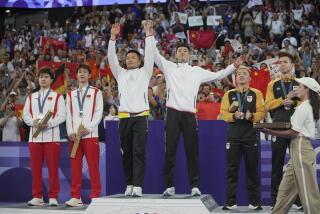China Sees Festive Way to Assert Its Claim to Taiwan
- Share via
BEIJING — China has added a new weapon in its long-standing propaganda battle with Taiwan: a party in the island’s honor.
On Thursday, Beijing announced plans to celebrate for the first time Taiwan’s return to Chinese rule from Japan on Oct. 25, 1945, with a ceremony in the Great Hall of the People in Tiananmen Square, the heart of political power here.
Nothing is ever as simple as it seems in cross-strait relations, marked by half a century of political machinations, and Thursday’s move was no exception.
By celebrating the 60th anniversary of the island’s return from Japan, China has several objectives, analysts said.
It’s attempting to strengthen its argument that Taiwan is part of China.
It hopes to drive another wedge between interest groups in Taiwan by inviting the island’s opposition lawmakers to the festivities and leaving government officials to snipe on the sidelines. Beijing has employed an increasingly sophisticated divide-and-conquer strategy since March.
It wants to send a message to its domestic constituents that Taiwan and China once cooperated in the battle against Japan, and only the Taipei government’s intransigence prevents closer ties.
And China hopes to make the Taiwanese government look churlish if Taipei complains too aggressively -- given that, after all, it’s only a party.
“To promote the peaceful reunification of the motherland and realize the revival and earnest struggle of the Chinese people, the central government in October will organize commemorations of the 60th anniversary of Taiwan’s return,” Li Weiyi, a spokesman at China’s Taiwan Affairs Office, told reporters in Beijing on Thursday.
Beijing has not previously celebrated the anniversary because it would have undercut its claim that the Communist Red Army, not the Nationalists, won the eight-year war against Japan, analysts said.
However, a warming of relations between the Communist and Nationalist parties, capped by then-Nationalist Chairman Lien Chan’s trip to Beijing this summer, has brought with it a revised view of history that helped clear the way for the celebration.
Beijing has invited about two dozen opposition Taiwanese politicians and scholars to attend, said George Tsai, a research fellow at the National Chengchi University in Taipei and one of the invitees.
Analysts say the opposition Nationalists have their own reason for sending delegates. In the run-up to island-wide municipal elections in December, they hope to send the message to local voters that their party built Taiwan’s miracle economy after World War II, not the ruling coalition, and that its pro-China policies can bring prosperity again.
They also hope to contrast their focus on economic growth and improved ties across the Taiwan Strait with a series of recent scandals dogging the Taipei government, including kickback allegations related to the hiring of Thai workers that have led to several resignations. To hammer the point home, the Nationalists also plan a political rally in Taipei tied to the anniversary.
Whether the Communists and Nationalists achieve their various objectives with the party depends on not overdoing it, some said.
“If China overplays the celebration, the strategy could backfire,” Tsai said. “And if the opposition fails to mobilize very many people for the rally, the Taiwanese people could start seeing it as too obviously political.”
China has sought to widen gaps among various interest groups on the island by offering incentives to select Taiwanese: low-cost financing to businesspeople operating in China, greater access for farmers to the huge Chinese market, reduced fees for students studying on the mainland and a promise to allow more Chinese tourists to travel across the strait.
But Jia Qingguo, a professor of international studies at Peking University, said too much was being made of these so-called united-front tactics.
“The important thing is that the mainland has improved cross-strait relations at a rapid pace, whereas Taiwan has engaged in infighting,” he said. “We’re trying to promote the idea that we’re all Chinese.”
Taiwan’s Mainland Affairs Council, the government office that oversees relations with China, reacted to Beijing’s announcement with skepticism.
The island’s return from Japan had “nothing at all to do” with China, it said in a statement. “The Chinese Communists have a gradual plan to work their way into Taiwan, and citizens should be alert to this.”
More to Read
Sign up for Essential California
The most important California stories and recommendations in your inbox every morning.
You may occasionally receive promotional content from the Los Angeles Times.













